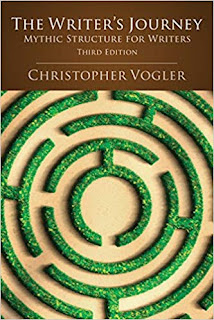Character Traits that Hike up Tension
Weeks ago, I did this post on the difference between tension and conflict. As a short recap, I mentioned that tension is not necessarily conflict, and I like to think of it as the promise of conflict, that anticipation and worry of what will happen.
As writers, we should definitely take advantage at the elements in our plot, world, and (yes) our conflicts to create tension. But over the years I've noticed that some smart writers really hike up the tension of a book through the traits of their viewpoint characters.
You see, some traits are natural tension-hikers.
The first time I noticed this was years ago, when reading The Hunger Games. In The Hunger Games, Katniss serves as our viewpoint character, but she has a couple of traits that amplify the story's tension. She's impulsive, and she doesn't follow directions. In her first Hunger Games, Haymitch, her mentor, tells her that when the countdown ends, she should run away from the cornucopia of weapons, food, and items to avoid a bloodbath. But then she sees a bow and arrows, that she's sure the Gamemakers put out specifically for her. In her moment of temptation, we feel tension. Katniss is impulsive. She doesn't listen to directions. In going for the bow and arrow, she is risking her life and serious injury.
I, myself, would never risk that, but Katniss does (which was a smart idea on Suzanne Collins part). Over and over again, throughout the series, Katniss's impulsiveness and inability to be directed hike up tension. And if she didn't have those attributes, some of the tension of the books would be lost. By the way, impulsiveness is a particularly fantastic trait to use.
The same thing works with a handful of attributes. A lot of young male protagonists are mouthy, which the audience knows can get them into trouble, which adds tension. Harry Potter is both mouthy and has a temper, so when a professor like Umbridge or Snape is intentionally trying to get under his skin, we hold our breaths to see what will happen. Will he lose it? What will the consequences be?
In my work-in-progress, I have a viewpoint character who is prone to worry and fear. Having him worry (imagine) what could happen and fear what might happen, helps bring tension that would otherwise not be there, in the story. I have another character who is very suspicious of people, and he likes being suspicious of people. His concepts of and ideas about other people can help hike up tension (especially if it is paired with another character's worry and fear). Another character yearns to be a hero, even to the point of taking stupid or rash risks. Therefore, that heroic desire hikes up tension.
All of these traits help with not only the macro level of your story, but the micro level too, sometimes making even short, innocent happenings full of tension. Sometimes this is simply because the story is filtered through that viewpoint character.
A whole slew of traits can hike up tension if a character is in a set-up that tests their limits and promises disaster. For example, we know Sherlock from BBC's Sherlock is a sociopath--he doesn't relate well to people. So when John asks him to be his best man, which entails giving a speech at the luncheon, there is a sort of tension to it. But if you never put your character in a set-up that tests her weaknesses like that, then we don't get to see those traits amplify tension. If your character is socially awkward, but we never really see him in a situation where he has to be social, the tension won't be there.
With that said, I would still argue that some traits are naturally better at hiking up tension than others. Having a character impulsive like Katniss is one. In contrast, having a character that is whiny doesn't really amplify tension (in most cases). A whiny character can still create a draw however. The character might be funny when she whines, which promises humor. But it doesn't create tension. There are many draws other than tension that can keep the audience engaged. But if you want to amplify tension, well, look for character traits that lend themselves to that for your story.




















Very nice breakdown of these characters and some of what makes them so appealing and tension building.
ReplyDeleteThis information was perfectly timed! I'm in the middle of character development for my WIP. I have a much better sense for what I need to accomplish now. Thank you for sharing!
ReplyDelete